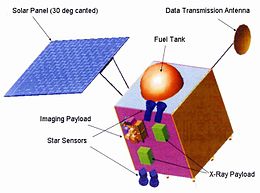Chandrayaan I

Diagram of Chandrayaan-1 spacecraft
|
|
| Mission type | Lunar orbiter |
|---|---|
| Operator | Indian Space Research Organisation |
| COSPAR ID | 2008-052A |
| SATCAT no. | 33405 |
| Website | www |
| Mission duration | Planned: 2 years Final: 310 days |
| Spacecraft properties | |
| Launch mass | 1,380 kg (3,040 lb) |
| Start of mission | |
| Launch date | 22 October 2008, 00:52 UTC |
| Rocket | PSLV-XL C11 |
| Launch site | Satish Dhawan Second Pad |
| Contractor | ISRO |
| End of mission | |
| Last contact | 28 August 2009, 20:00 UTC |
| Orbital parameters | |
| Reference system | Selenocentric |
| Semi-major axis | 1,758 kilometers (1,092 mi) |
| Eccentricity | 0.0 |
| Periselene | 200 km (120 mi) |
| Aposelene | 200 km (120 mi) |
| Epoch | 19 May 2009 |
| Lunar orbiter | |
| Orbital insertion | 8 November 2008 |
| Orbits | 3,400 at EOM |
|
|
|
Chandrayaan-1 (Sanskrit: चन्द्रयान-१,(Sanskrit: [ t͡ʃʌnd̪ɾʌːjaːn]; lit: Moon vehicle![]() pronunciation ) was India's first lunar probe. It was launched by the Indian Space Research Organisation in October 2008, and operated until August 2009. The mission included a lunar orbiter and an impactor. India launched the spacecraft using a PSLV-XL rocket, serial number C11, on 22 October 2008 from Satish Dhawan Space Centre, Sriharikota, Nellore District, Andhra Pradesh, about 80 km north of Chennai, at 06:22 IST (00:52 UTC). Prime minister Atal Bihari Vajpayee announced the project on course in his Independence Day speech on 15 August 2003. The mission was a major boost to India's space program, as India researched and developed its own technology in order to explore the Moon. The vehicle was successfully inserted into lunar orbit on 8 November 2008.
pronunciation ) was India's first lunar probe. It was launched by the Indian Space Research Organisation in October 2008, and operated until August 2009. The mission included a lunar orbiter and an impactor. India launched the spacecraft using a PSLV-XL rocket, serial number C11, on 22 October 2008 from Satish Dhawan Space Centre, Sriharikota, Nellore District, Andhra Pradesh, about 80 km north of Chennai, at 06:22 IST (00:52 UTC). Prime minister Atal Bihari Vajpayee announced the project on course in his Independence Day speech on 15 August 2003. The mission was a major boost to India's space program, as India researched and developed its own technology in order to explore the Moon. The vehicle was successfully inserted into lunar orbit on 8 November 2008.
...
Wikipedia
